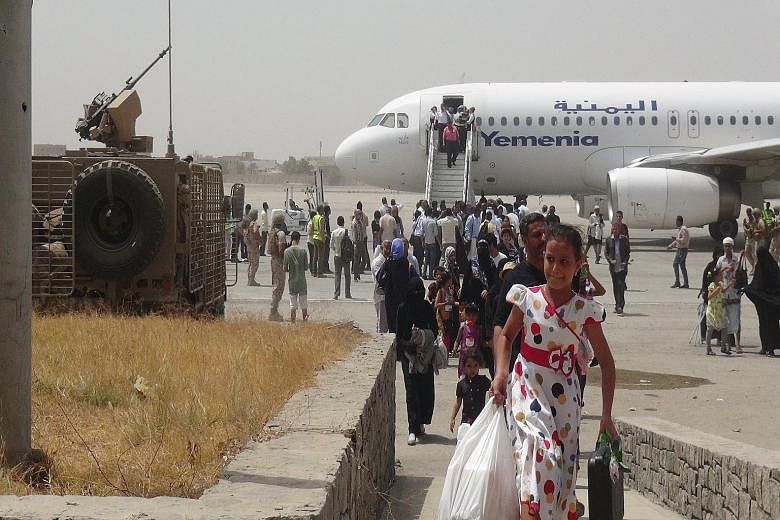ADEN • Yemeni refugees cheered and wailed as their plane dipped towards Aden, returning them to a precarious life in their home city three weeks after fighting there ended and months after most of them fled.
But for many refugees returning to a city without regular water or electricity and shattered by months of intense street fighting, the joy of being home was tempered by grief at the sight of destruction and uncertainty over the future.
"I can't believe it. I can't believe the damage," said Mr Muheeb Ishaq quietly, gazing in horror at the ruined airport terminal building and the shredded remains of hangars. His father, who was also on the flight, had to turn his face away with grief before saying: "Look at what they did! I have known all these since I was born.
"It was a paradise."
Their flight from Jordan, one of the first by Yemen Airways to reach Aden, was paid for by the country's exiled government, part of its efforts to re-establish normality in the city after local fighters it backs ousted the northern-based Shi'ite Houthi militia last month.
The fighters, with military help from Gulf countries suspicious of the Houthis' ties to Iran, retook Aden's airport on July 17, a turning point in the civil war after four months of stalemate.
They have since pushed further into southern Yemen.
On Monday, the government of President Abdu Rabu Mansour Hadi, who fled Aden in March for Riyadh, said groups it supports, backed by Gulf air strikes and arms, had retaken parts of Ibb province and were advancing in Abyan province.
The Ishaqs, a prosperous middle-class family, left Aden on an Indian navy ship for Djibouti on April 10 after tank shells and mortars fell near their home.
"Will there be electricity or water? I don't know," said Mr Ishaq, 35, sitting next to his sleeping four-year-old son Mahbub, a suitcase and houseplant propped on the plane floor before him, while one-year-old Offa sat fussing on his mother's lap.
The family, including Mr Ishaq's parents, siblings and their families, decided to return home despite such fears because of the hardships they faced as impoverished refugees, first in Djibouti and then in Jordan.
They were quick to voice their love for Aden and pride in the successful lives forged there before the war, and said they were determined to rebuild.
Out of the window, mountains, clifftop villages and terraced farms unfolded far below.
But as the pilot announced the plane's impending arrival in Aden, it was not Yemen's national flag that passengers waved, but that of a southern separatist movement.
It showed how, as the fighting continues, the civil war is no longer simply about who will rule Yemen, or to which regional power it will be allied, but over whether it can remain a country at all.
"We will liberate the south," said mechanical engineering student Alqadr Tawfiq, 22, who was returning on the plane with his wife and infant son. "The Houthis can go back north."
REUTERS

